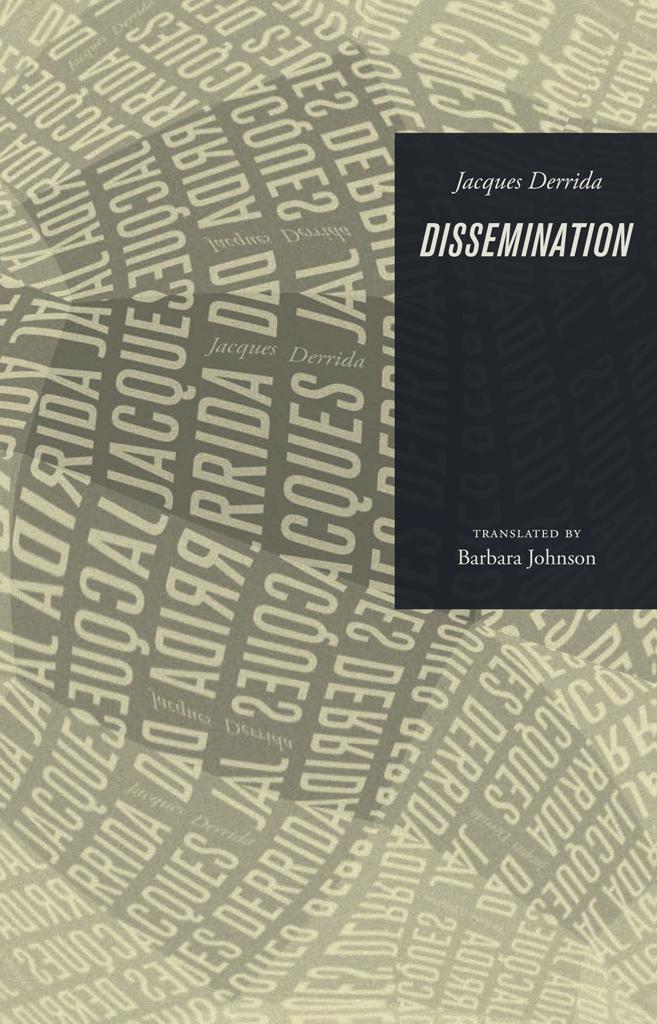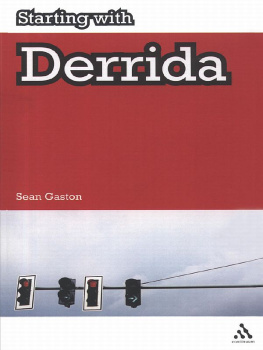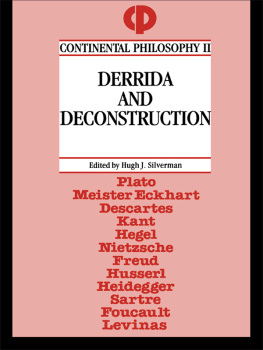Jacques Derrida - Dissemination: Reissue Edition
Here you can read online Jacques Derrida - Dissemination: Reissue Edition full text of the book (entire story) in english for free. Download pdf and epub, get meaning, cover and reviews about this ebook. City: Chicago, year: 2017, publisher: University of Chicago Press, genre: Science. Description of the work, (preface) as well as reviews are available. Best literature library LitArk.com created for fans of good reading and offers a wide selection of genres:
Romance novel
Science fiction
Adventure
Detective
Science
History
Home and family
Prose
Art
Politics
Computer
Non-fiction
Religion
Business
Children
Humor
Choose a favorite category and find really read worthwhile books. Enjoy immersion in the world of imagination, feel the emotions of the characters or learn something new for yourself, make an fascinating discovery.

- Book:Dissemination: Reissue Edition
- Author:
- Publisher:University of Chicago Press
- Genre:
- Year:2017
- City:Chicago
- Rating:5 / 5
- Favourites:Add to favourites
- Your mark:
- 100
- 1
- 2
- 3
- 4
- 5
Dissemination: Reissue Edition: summary, description and annotation
We offer to read an annotation, description, summary or preface (depends on what the author of the book "Dissemination: Reissue Edition" wrote himself). If you haven't found the necessary information about the book — write in the comments, we will try to find it.
Dissemination: Reissue Edition — read online for free the complete book (whole text) full work
Below is the text of the book, divided by pages. System saving the place of the last page read, allows you to conveniently read the book "Dissemination: Reissue Edition" online for free, without having to search again every time where you left off. Put a bookmark, and you can go to the page where you finished reading at any time.
Font size:
Interval:
Bookmark:


The University of Chicago Press, Chicago 60637
The Athlone Press, London
1981 by The University of Chicago
All rights reserved. Published 1981
Printed in the United States of America
24 23 22 21 20 19 18 17 13 14 15 16 17 18
ISBN: 978-0-226-50347-9
ISBN: 978-0-226-81634-0 (ebook)
This work was published in Paris under the title La Dissmination,
Editions du Seuil, 1972.
Library of Congress Cataloging-in-Publication Data
Derrida, Jacques.
Dissemination.
Translation of: La dissmination.
I. Title.
AC25.D45513 808.00141 81-3359
ISBN 0-226-14334-1 (paper) AACR2
The paper used in this publication meets the minimum requirements of the American National Standard for Information SciencesPermanence of Paper for Printed Library Materials, ANSI Z39.48-1992.
Jacques Derrida
Translated, with an Introduction and Additional Notes, by
Barbara Johnson
The University of Chicago Press
All translation is only a somewhat provisional way of coming to terms with the foreignness of languages.
Walter Benjamin, The Task of the Translator
What is translation? On a platter
A poets pale and glaring head,
A parrots screech, a monkeys chatter,
And profanation of the dead.
Vladimir Nabokov, On Translating Eugene Onegin
Jacques Derrida, born in Algiers in 1930, teaches philosophy at the Ecole Normale Suprieure in Paris. His tremendous impact on contemporary theoretical thought began in 1967 with the simultaneous publication of three major philosophical works: La Voix et le phnomne (an introduction to the problem of the sign in Husserls phenomenology; translated by David Allison as Speech and Phenomena [Evanston: Northwestern University Press, 1973]), Lcriture et la diffrence (a collection of essays on the problematics of writing in literature, philosophy, psychoanalysis, and anthropology; translated by Alan Bass as Writing and Difference [Chicago: University of Chicago Press, 1978]), and De la grammatologie (a sustained analysis of the repression of writing in Western theories of language and culture and a methodological and theoretical outline of a new science of writing; translated by Gayatri Chakravorty Spivak as Of Grammatology [Baltimore: Johns Hopkins University Press, 1974]).
Five years later, in 1972, came another tripartite Derridean biblioblitz: Positions (a collection of interviews; translated by Alan Bass as Positions [Chicago: University of Chicago Press, 1981]), Marges: de la philosophie (a collection of essays in/on the margins of philosophy, linguistics, and literature [translation in preparation, University of Chicago Press]), and La Dissmination.
Since 1972, Derridas work has continued to proliferate and diversify. Glas (a giant montage of textual grafts and hardworking wordplays in which Hegel and Genet are shuffled into each other from juxtaposed columns of print) appeared in 1974, followed, among numerous articles and short works, by a collection of critical essays on painting, La Vrit en peinture (1978), and, in 1980, by La Carte Postale: de Socrate Freud et au-del, an intriguing collection of essays that treat the psychoanalytical writings of Freud and Jacques Lacan, preceded by a pseudo-fictional, pseudo-autobiographical epistolary preface that hinges on a postcard depicting Plato dictating behind the back of a writing Socrates.
Best known in this country for having forged the term deconstruction, Jacques Derrida follows Nietzsche and Heidegger in elaborating a critique of Western metaphysics, by which he means not only the Western philosophical tradition but everyday thought and language as well. Western thought, says Derrida, has always been structured in terms of dichotomies or polarities: good vs. evil, being vs. nothingness, presence vs. absence, truth vs. error, identity vs. difference, mind vs. matter, man vs. woman, soul vs. body, life vs. death, nature vs. culture, speech vs. writing. These polar opposites do not, however, stand as independent and equal entities. The second term in each pair is considered the negative, corrupt, undesirable version of the first, a fall away from it. Hence, absence is the lack of presence, evil is the fall from good, error is a distortion of truth, etc. In other words, the two terms are not simply opposed in their meanings, but are arranged in a hierarchical order which gives the first term priority, in both the temporal and the qualitative sense of the word. In general, what these hierarchical oppositions do is to privilege unity, identity, immediacy, and temporal and spatial presentness over distance, difference, dissimulation, and deferment. In its search for the answer to the question of Being, Western philosophy has indeed always determined Being as presence.
Derridas critique of Western metaphysics focuses on its privileging of the spoken word over the written word. The spoken word is given a higher value because the speaker and listener are both present to the utterance simultaneously. There is no temporal or spatial distance between speaker, speech, and listener, since the speaker hears himself speak at the same moment the listener does. This immediacy seems to guarantee the notion that in the spoken word we know what we mean, mean what we say, say what we mean, and know what we have said. Whether or not perfect understanding always occurs in fact, this image of perfectly self-present meaning is, according to Derrida, the underlying ideal of Western culture. Derrida has termed this belief in the self-presentation of meaning Logocentrism, from the Greek word Logos (meaning speech, logic, reason, the Word of God). Writing, on the other hand, is considered by the logocentric system to be only a representation of speech, a secondary substitute designed for use only when speaking is impossible. Writing is thus a second-rate activity that tries to overcome distance by making use of it: the writer puts his thought on paper, distancing it from himself, transforming it into something that can be read by someone far away, even after the writers death. This inclusion of death, distance, and difference is thought to be a corruption of the self-presence of meaning, to open meaning up to all forms of adulteration which immediacy would have prevented.
In the course of his critique, Derrida does not simply reverse this value system and say that writing is better than speech. Rather, he attempts to show that the very possibility of opposing the two terms on the basis of presence vs. absence or immediacy vs. representation is an illusion, since speech is already structured by difference and distance as much as writing is. The very fact that a word is divided into a phonic signifier and a mental signified, and that, as Saussure pointed out, language is a system of differences rather than a collection of independently meaningful units, indicates that language as such is already constituted by the very distances and differences it seeks to overcome. To mean, in other words, is automatically not to be. As soon as there is meaning, there is difference. Derridas word for this lag inherent in any signifying act is diffrance, from the French verb diffrer, which means both to differ and to defer. What Derrida attempts to demonstrate is that this diffrance inhabits the very core of what appears to be immediate and present. Even in the seemingly nonlinguistic areas of the structures of consciousness and the unconscious, Derrida analyzes the underlying necessity that induces Freud to compare the psychic apparatus to a structure of scriptural diffrance, a mystic writing-pad. The illusion of the self-presence of meaning or of consciousness is thus produced by the repression of the differential structures from which they spring.
Font size:
Interval:
Bookmark:
Similar books «Dissemination: Reissue Edition»
Look at similar books to Dissemination: Reissue Edition. We have selected literature similar in name and meaning in the hope of providing readers with more options to find new, interesting, not yet read works.
Discussion, reviews of the book Dissemination: Reissue Edition and just readers' own opinions. Leave your comments, write what you think about the work, its meaning or the main characters. Specify what exactly you liked and what you didn't like, and why you think so.















